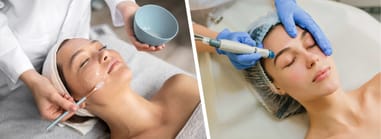Is hyaluronic acid effective for acne & blackheads?
With the skincare world buzzing about its benefits, many wonder, "is hyaluronic acid good for acne?" I am here to give you the lowdown on how it affects acne-prone skin, blackheads, and other skin dilemmas. Let's go!
What is hyaluronic acid?
Hyaluronic acid, often featured in the spotlight of skincare trends, is not a recent discovery, but a naturally occurring substance in our skin. But what exactly is this compound that has the beauty world swooning?
First and foremost, despite the "acid" in its name, don't imagine a harsh, skin-stripping substance. In fact, it's quite the opposite. Hyaluronic acid (HA) is a glycosaminoglycan, a fancy term for a sugar molecule that attracts and retains moisture. Think of it as nature's sponge; its primary role in the body is to retain water, ensuring our tissues remain lubricated and moist.
Found abundantly in our skin, eyes, and connective tissues, its moisture-binding capability is the stuff of legends. A single gram of hyaluronic acid can hold up to six liters of water. Yes, you read that right! This superhero hydration agent has a remarkable ability to keep our skin plump, smooth, and moisturized.
A single gram of hyaluronic acid can hold up to six liters of water.
As we age, however, the amount of hyaluronic acid our body produces begins to decrease, leading to the dreaded signs of aging: fine lines, wrinkles, and a loss of elasticity. It's no wonder the beauty industry has harnessed its powers, formulating it into serums, creams, and even injectables to replenish what time and environmental factors take away.
Beyond just hydration, HA plays a pivotal role in skin regeneration and can even provide an antioxidant defense against environmental aggressors. When applied topically, it acts as a magnet for moisture, drawing hydration to the skin's surface and holding it there for a youthful, dewy finish.
In conclusion, in the bustling lanes of skincare, hyaluronic acid stands tall as a true hydration powerhouse. Its unique properties make it indispensable for those in pursuit of radiant and youthful skin.
Keep clients coming back forever!
Want loyal clients who rave about your salon? Download our loyalty checklist to unlock 6 game-changing secrets that ensure clients keep returning.
Oh no! We couldn’t subscribe you ☹️
Done! We've sent a link to your Email 📨
What does hyaluronic acid do for acne?
Acne, a consistent adversary for many, might have met its match with hyaluronic acid. While this substance is frequently praised for its hydrating properties, its role in combating acne is more multifaceted than one might think. So, does hyaluronic acid help acne? The answer lies in its diverse skincare benefits.
Controls sebum production
Excessive sebum, our skin's natural oil, is a leading contributor to acne. An imbalance can lead to clogged pores and eventual breakouts. Here’s where hyaluronic acid for acne proves its worth:
- Balance: even though it doesn't directly reduce sebum, a well-hydrated skin with HA feels less compelled to produce excessive oil.
- Pore care: with balanced oil production, pores are less likely to become blocked, thus reducing acne's chances.
Strengthens hydration
Hydrated skin is your first line of defense against irritants. But how does hydration prevent acne?
- Barrier function: hyaluronic acid benefits for acne are evident as it strengthens the skin barrier. A strong barrier is less susceptible to irritants that can make acne worse.
- Healing: moisturized skin also heals more swiftly, potentially reducing acne breakouts' longevity.
Minimizes scar formation
The scars left behind from acne often linger long after the breakout. Hyaluronic acid plays a role here too:
- Tissue repair: it promotes skin regeneration, aiding in reducing the visibility of post-acne scars.
- Boosts elasticity: by maintaining hydration, skin elasticity is preserved, further reducing potential scars.
Has antibacterial properties
Hyaluronic acid, surprisingly, has mild antibacterial qualities:
- Defense: it provides a layer of defense against certain bacteria on the skin.
- Prevention: this can aid in preventing bacterial-caused acne outbreaks.
It isn't a substitute for specific antibacterial treatments, but it adds another layer of defense.
Intensifies wound healing
Acne, when it breaks the skin, is technically a wound. Hyaluronic acid accelerates the skin's natural repair:
- Repair mechanism: this is where hyaluronic acid benefits for acne shine as it assists in healing these wounds quicker.
- Collagen production: essential in wound repair, HA promotes collagen production.
Reduces redness and swelling
The inflammation surrounding acne is a significant concern:
- Anti-inflammatory: hyaluronic acid has properties that can reduce acne-associated redness.
- Soothing effect: a significant benefit of hyaluronic acid for acne is its calming effect on the skin, diminishing inflammation.
To conclude, when we ask, “What does hyaluronic acid do for acne?”, it's clear that it doesn’t just hydrate but offers a comprehensive approach to acne management. For those contending with acne, hyaluronic acid emerges as a potent ally, eager to restore both skin health and self-assuredness.
Using hyaluronic acid for the acne effects on the skin
Hyaluronic acid, hailed for its incredible moisturizing capabilities, has shown promise in addressing various skin issues, particularly those resulting from acne. But how does this skincare marvel impact the more prominent acne manifestations, such as scars, blackheads, and cystic acne pimples?
Acne scars
Acne scars are the haunting remnants of past breakouts, often serving as unwanted reminders of skin battles won and lost.
How hyaluronic acid helps:
- Skin repair: hyaluronic acid stimulates skin repair, prompting the rapid regeneration of skin cells.
- Elasticity boost: it also retains moisture, ensuring that the skin remains supple and elastic, thus reducing the appearance of pitted or atrophic scars.
Esthetician example: my client, Sarah, has been battling with acne scars on her cheeks for years. After introducing a hyaluronic acid serum into her routine, she noticed a marked reduction in the depth and appearance of her scars over a few months.
Blackheads
Often appearing like tiny black dots on the skin, especially around the nose and chin, blackheads occur when pores get clogged with excess sebum and dead skin cells. While they might not be as inflammatory as pimples, their appearance can be unsettling.
How hyaluronic acid helps:
- Sebum control: by ensuring that the skin is well-hydrated, it indirectly helps in controlling sebum production. Balanced sebum means fewer chances of clogged pores and, consequently, fewer blackheads.
Pore tightening: consistent use of hyaluronic acid can lead to tighter skin and refined pores, making it harder for blackheads to form.
Esthetician advice: if you're troubled by blackheads on your nose, start to use a toner infused with hyaluronic acid.
Cystic acne pimples
Perhaps the most severe form of acne, cystic pimples are deep, painful, and filled with pus. They can linger for weeks and can lead to scarring if not treated properly.
How hyaluronic acid helps:
- Anti-inflammatory properties: the soothing nature of hyaluronic acid can help reduce the inflammation associated with cystic pimples.
- Wound healing: hyaluronic acid aids in the skin's natural repair mechanism, helping these deeper lesions heal faster and reducing the risk of scarring.
- Hydration: a well-hydrated skin barrier can better defend against the bacteria and irritants that exacerbate cystic acne.
In conclusion, while hyaluronic acid might not be the first ingredient that comes to mind when thinking of acne treatments, its multi-faceted approach to skin healing makes it a potent weapon in combating the aftermath of acne. It's no wonder that so many swear by its benefits, from reducing scars to taming the most aggressive of pimples.
Key benefits of hyaluronic acid for acne
The use of hyaluronic acid for skincare has been receiving acclaim, particularly for its transformative effects on acne-prone skin. This natural compound, present in our skin, offers advantages that extend far beyond mere hydration. Let's explore the key benefits of hyaluronic acid for acne.
It restores the skin barrier
The skin barrier acts like a protective shield, guarding against external irritants and retaining essential moisture. A compromised barrier often leads to issues like sensitivity, dryness, and acne.
How hyaluronic acid helps:
- Reinforcement: by replenishing the skin's hydration levels, hyaluronic acid reinforces this vital barrier, making it more resilient.
- Healing aid: it aids in the healing process, mending any weaknesses in the barrier.
Does not clog pores
A common concern with skincare products is whether they will clog pores, potentially leading to more acne.
How hyaluronic acid helps:
- Non-comedogenic: hyaluronic acid has a unique, lightweight texture that doesn’t clog pores.
- Versatile: it can be found in various formulations that suit different skin types, ensuring everyone can reap its benefits without fearing breakouts.
Esthetician advice: if you have oily skin, are cautious about using moisturizers, then trying a hyaluronic acid-based gel might give you hydration without worsening your acne, all due to its non-clogging nature.
Can be used on any part of the skin
Unlike some targeted treatments, hyaluronic acid is gentle and versatile enough to be used on all areas of the skin.
How hyaluronic acid helps:
- Universal application: Whether it's facial acne, chest, back, or even more sensitive areas, hyaluronic acid can be applied without fear of irritation.
- Gentle: its calming properties make it suitable even for skin types that are prone to sensitivity.
It helps reinforce the action of other moisturizing ingredients
Hyaluronic acid is often considered a team player in skincare formulations.
How hyaluronic acid helps:
- Synergistic effects: it works in harmony with other moisturizing ingredients, enhancing their effects.
Layering capability: it can be layered with other products without losing efficacy, making it a valuable addition to many skincare routines.
Esthetician advice: if you're already using a vitamin C serum, then adding a hyaluronic acid serum to your routine might make your skin feel even more nourished. This could be due to the combined effects of both ingredients working in harmony.
In summary, the key benefits of hyaluronic acid for acne are evident in its restorative, non-clogging, versatile, and collaborative properties. These advantages make it an invaluable component in the quest for clear, healthy skin, fitting seamlessly into various routines and skin types. It's not just a trend; it's a testament to what modern skincare can achieve.
Potential risks and side effects
Hyaluronic acid is generally regarded as safe for most users, but like all skincare ingredients, it may not be for everyone.
A few potential side effects to be aware of:
- Reactions: some may experience redness, itching, or minor breakouts when first introducing the product.
- Overuse: excessive application can lead to skin feeling too hydrated or puffy.
- Interactions: rarely, it might not play well with other products in one's skincare routine, leading to irritation.
It's always advised to do a patch test and introduce any new product gradually.
The bottom line: so does hyaluronic acid help with acne?
In essence, yes, hyaluronic acid can be highly beneficial for those contending with acne. This naturally occurring substance provides unparalleled hydration, ensuring skin remains moisturized without risking pore blockage. It plays a pivotal role in restoring the skin's barrier, thus defending against external irritants that exacerbate acne. Furthermore, its versatile nature complements other acne-fighting ingredients, amplifying their effects in a skincare routine.
However, what truly makes hyaluronic acid stand out is its adaptability; whether you have oily skin, dry patches, or sensitivity, its benefits are manifold. Its potential side effects are few and far between, and with its growing prominence in skincare, many users have reported transformative results. In the constantly evolving landscape of skincare, hyaluronic acid has made a definitive mark.
Its efficacy, combined with its minimal risks, positions it as a formidable ally in the fight against acne. As always, individual experiences can vary, so it's crucial to consult with a dermatologist or skincare expert to tailor its use to your specific needs. But for many, hyaluronic acid has shifted from being a mere trend to a skincare essential, proving its mettle in promoting clearer, healthier skin.
Always consult with a dermatologist for personalized advice.
 Elevate your glow with proven beauty secrets
Elevate your glow with proven beauty secrets
Dive in now for the latest beauty hacks, expert-approved tips, and transformative routines!
Oh no! We couldn’t subscribe you ☹️
Done! You've subscribed 💛
Unsubscribe anytime. Your data is stored for business-to-business communication purposes. See our Privacy policy.
Frequently asked questions
Is hyaluronic acid good for acne and oily skin?
Yes, hyaluronic acid is excellent for both acne and oily skin. It hydrates without clogging pores and helps control sebum production, making it ideal for oily, acne-prone skin.
How long does it take for hyaluronic acid to work on acne?
Results can vary, but many people notice improved skin hydration within a day or two. For visible acne reduction, it may take a few weeks of consistent use.
Can hyaluronic acid be used in combination with other acne treatments?
Absolutely, hyaluronic acid complements many acne treatments like salicylic acid and benzoyl peroxide. It enhances moisture retention, helping offset the drying effects of other ingredients.
Is hyaluronic acid suitable for acne-prone skin?
Yes, hyaluronic acid is suitable for acne-prone skin. It's non-comedogenic and aids in repairing the skin barrier, reducing the chances of acne flare-ups.
Can hyaluronic acid be used as a spot treatment for acne?
While not a typical spot treatment, hyaluronic acid can help hydrate and heal acne-affected areas. However, it's best used as part of a broader skincare regimen.
Last updated on Apr 11, 2025
“What Changed” in this article? Everything. It's packed with the latest findings, the ripest data, and a fresh analysis you won't find anywhere else.
A subject-matter expert wrote the content, and reliable, official sources support it. Recent research has been incorporated to maintain relevancy and accuracy.
Key sources and research references: aocd and naomedical
Please share this post
Table of Contents
What is hyaluronic acid?What does hyaluronic acid do for acne?Using hyaluronic acid for the acne effects on the skinKey benefits of hyaluronic acid for acnePotential risks and side effectsThe bottom line: so does hyaluronic acid help with acne?Frequently asked questionsMicroneedling vs. chemical peel: comparison & combining tips
Explore all about microneedling and chemical peels. Delve into how each method works and whether they can safely be combined. Get expert advice to make an informed decision for your skincare journey!
Chemistry of beauty
6 min
How much does a cosmetologist make | Average cosmetology salary
Are you interested in a career in cosmetology and want to know how much cosmetologists make? Check out our article to learn about the average cosmetology salary and the factors that determine it.
Carreer in beauty business
8 min
The role of vitamins in modern cosmetics
Ever wondered if natural Vitamin C is better than synthetic ascorbic acid? Or why synthetic Vitamin E is so common in skincare? This article explains the real differences, benefits, and myths about vitamins in cosmetics — so you can choose wisely.
Chemistry of beauty
11 min
Unlock the secrets to beauty business success!
Join our community for insider tips on product management, marketing, sales and client attraction. Elevate your business with expert insights delivered straight to your inbox.
Oh no! We couldn’t subscribe you ☹️
Done! You've subscribed 💛
Trusted by the best in the beauty industry.
Transform your beauty business with Suplery!
Already enjoying our expert tips? Take the next step and join Suplery to revolutionize your business operations.
Huge range of professional products
One-click checkout after first order
Automated predictive orders
Seamless inventory management
From words to action
Start working with Suplery and explore all the tools and services you need to expand your business
Get started with Suplery24/7 Support
Secure payments
Designed by industry’s experts






